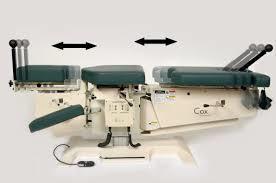
The Cox Technique is a gentle, non-force chiropractic method that utilizes spinal decompression and flexion-distraction, whereas traditional chiropractic typically employs quick, manual thrusts. Cox is ideal for disc issues, spinal stenosis, and sensitive patients, offering a lower-force alternative to conventional adjustments.
Understanding the Two Approaches
Chiropractic care comes in many forms, each designed to relieve pain, restore mobility, and support long-term spinal health. But not all techniques are the same.
At PT & Chiro of Miami, we offer both traditional chiropractic care and advanced techniques, such as the Cox Method, tailoring treatment to each patient’s specific needs, comfort level, and diagnosis.
What Is the Cox Technique?
The Cox Technique is a specialized chiropractic method that uses a flexion-distraction table to decompress the spine gently. It’s ideal for patients with herniated discs, spinal stenosis, nerve compression, and post-surgical spine conditions.
Key Features:
- Slow, rhythmic spinal flexion and decompression
- Little to no joint cracking or twisting
- Precise, segmental adjustments
- Customizable force based on patient condition
What Is Traditional Chiropractic?
Traditional chiropractic adjustments often use quick, high-velocity, low-amplitude (HVLA) thrusts to realign the spine. These may produce a “popping” sound as joint pressure releases.
Common Techniques Include:
- Diversified technique
- Gonstead technique
- Thompson drop-table
- Activator (instrument-assisted)
Comparing the Cox Technique vs Traditional Chiropractic
| Feature | Cox Technique | Traditional Chiropractic |
|---|---|---|
| Style of Adjustment | Gentle, slow decompression | Quick manual thrusts |
| Force Level | Low-force | Moderate to high-force |
| Noise ("popping") | Rare or none | Common |
| Ideal For | Disc herniation, spinal stenosis, nerve impingement | Joint misalignment, general mobility |
| Equipment Used | Special flexion-distraction table | Manual or drop table |
| Patient Comfort | High—especially for sensitive spines | Varies by individual |
Which One Is Right for You?
If you’ve had back surgery, have severe disc issues, or are nervous about traditional adjustments, the Cox Technique may be the best fit. It’s also an excellent option for older adults or patients with fragile bones.
Traditional methods can be highly effective for joint stiffness, posture issues, and general wellness care, especially when combined with exercise and posture training.
Why PT & Chiro of Miami Offers Both
We believe no two patients—or spines—are alike. That’s why we offer a full spectrum of chiropractic techniques, including Cox, Diversified, and soft tissue therapies. Our chiropractors assess your condition and goals to design a plan that works best for you.
Frequently Asked Questions (FAQ)
Is the Cox Technique better than regular chiropractic?
It depends on your condition. Cox is gentler and preferred for disc problems, while traditional methods may work better for joint mobility and general care.
Is there cracking with the Cox Technique?
No. The Cox Method uses slow, decompressive movements without the popping or twisting common in traditional adjustments.
Can I switch between techniques?
Yes. Many patients benefit from a blended approach. Our team will recommend the best combination for your recovery.
Does insurance cover the Cox Technique?
Most insurance plans that cover chiropractic care also cover the Cox Technique. Our office can verify your benefits before starting care.
Do both techniques take the same amount of time?
Not always. Cox sessions may take slightly longer due to the slow, rhythmic nature of the treatment, but they’re highly targeted and effective.
Ready to Find the Right Chiropractic Fit?
Whether you prefer a traditional approach or want the gentle precision of the Cox Technique, we’re here to help. At PT & Chiro of Miami, you’ll get care that’s tailored, informed, and always patient-centered.
Schedule your appointment today to discover which technique is best suited for your body and goals.

Dr. Joseph Hudson
Contact Me

